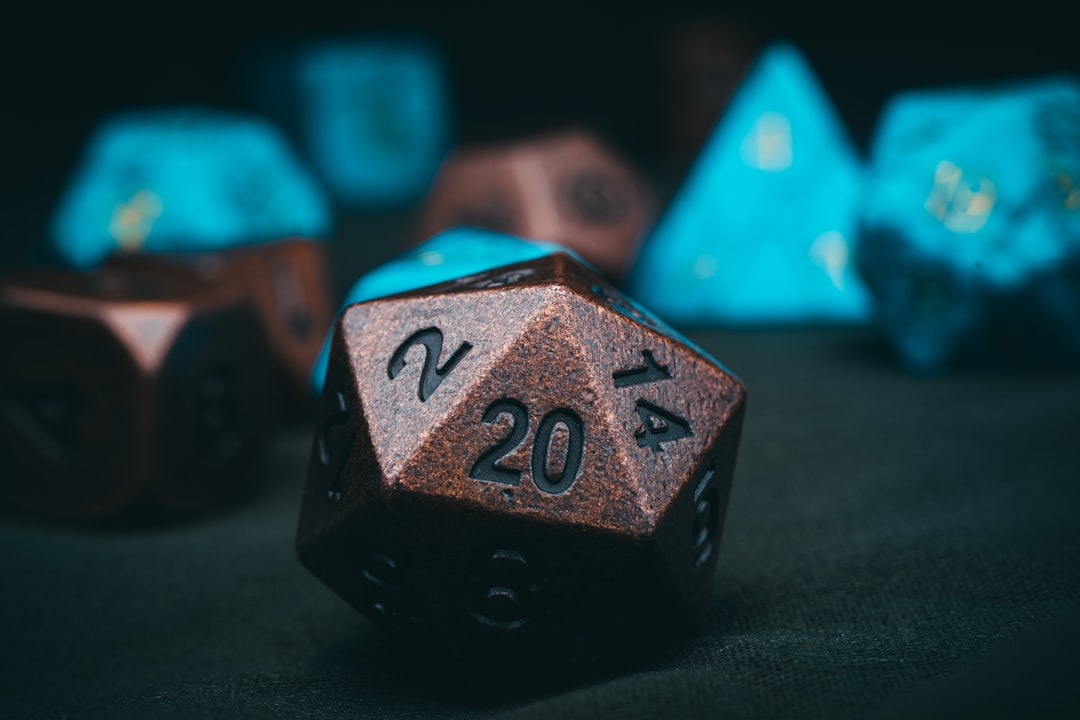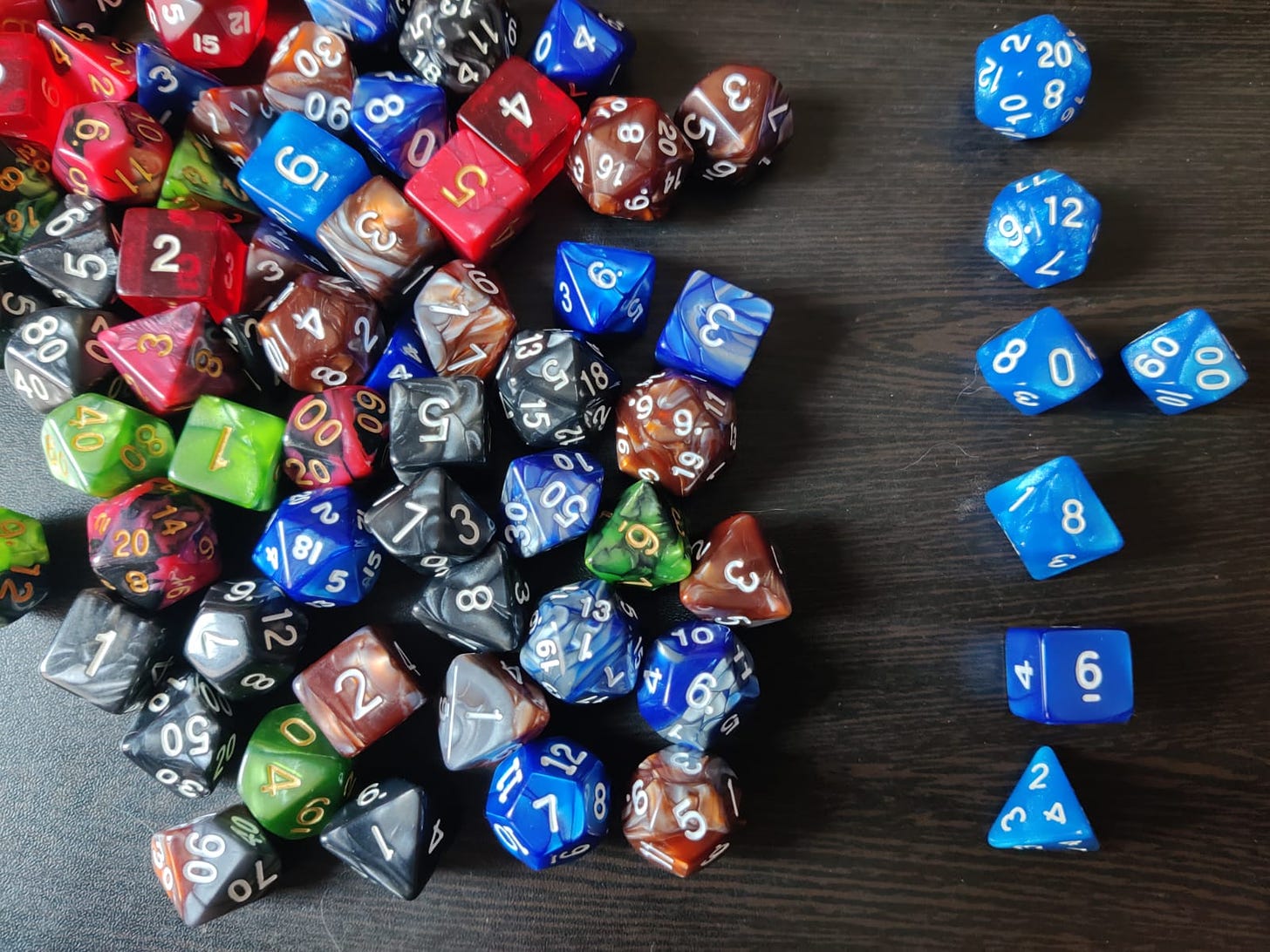Why I Love Dungeons and Dragons
I’m currently depressed out of my mind and just want to write something, but haven’t been able to do much of anything, so this is an attempt to write about a hobby that brings me solace.

Dungeons and Dragons! Maybe you’ve heard of this influential tabletop game, or maybe you haven’t. Maybe you’ve seen it in passing on that one episode of The Big Bang Theory or as a strong influence on Stranger Things. Or maybe you have no idea what I’m talking about, so let me introduce you.
D&D, as it is fondly known, is a Tabletop Role-Playing Game (TTRPG), which means that it is a game (there’s dice involved) where you role-play (act as a character) around a table (with friends). Think of it as a board game without a board. Instead, you play with pencil and paper, dice, and 🌈imagination🌈.
I've been playing this game since 2019 and I absolutely love it. Why? It's a social, cooperative, storytelling game where anything can happen - you sit at a table with friends and imagine a story together, and whenever the game needs a decision made, you roll dice.
There are thousands of games in the TTRPG genre, but D&D in particular is about brave heroes going on adventures, finding treasure, and fighting monsters. Think about it,
Where else can you meet and fight dragons, vampires, and octopus-faced aliens?
How else can you go climbing mountains, delving into caves, and navigating rivers without extreme physical effort?
When else will you get a chance to interact with kings, mages, and even gods?
Although D&D is technically a “Swords and Sorcery” genre game, i.e. it is set in a semi-medieval “ye olde tavern” type of setting, there is no limitation to the type of story you’re telling. The D&D system can be adapted to other genres of storytelling.
For me, the game harkens back to the earliest form of social interaction there is - sitting around a fire and telling stories. I love this game because it’s a group activity of creative freedom, and that is a rare thing in today’s world.
How does the game work?
The group of players is divided into 1 Game Master, or GM, and several Player Characters, or PCs.
Each PC plays the role of a hero — whether they play a swashbuckling rogue, a hardy fighter, a reckless barbarian, or an erudite wizard, they are the protagonists of the story.
The GM meanwhile, plays the role of the rest of the world. They act as the Non-Player Characters (NPCs) you meet, the villains and monsters you fight, and the challenges you encounter. This does mean that the GM has significant work to do in session planning.
When you start playing, the GM describes a scene, and the PCs in the scene then take turns describing what they choose to do. Based on what they do, the GM reacts and describes what happens.
Any time the heroes attempt something that has a chance of failure, the GM asks them to roll a special dice called a d20, add a number to it, and see if they beat a threshold value. If they beat it, it’s a success! The GM and PC together describe the successful action the hero takes. If they fail to beat the value, the GM describes how the hero fails at the action they take.
The game is basically a repetition of this flow of events - narration, player action, dice rolls, and outcomes.
How much work does it require to play the game?
A lot of the work required for the game happens before you ever start playing. Each PC designs their hero, and makes their character sheet, a document that gives you all the information you need about your hero, such as their level, their race and class, their background and values, and their magic powers.
The GM meanwhile plans the story and makes notes about the locations, NPCs, monsters, and treasure that the PCs will run into. This can be significant work, especially if you like to embellish the game with maps, tokens, artwork, cards, and more. But at the core of the game, you only need words, which takes a lot of the work out.
Beyond that, the game doesn’t require much work at the table at all - it is just storytelling fun and ooh-ing and aah-ing at the rolls of the dice.
Tell me more about these dice!
D&D uses a set of polyhedral dice. These contain 7 dice, each denoted by the number of sides it has. So a d20 is a 20-sided die. A d6 is a normal 6-sided die.
A full polyhedral set contains a d4, a d6, a d8, two d10s, a d12, and a d20. In D&D, you roll the d20 for every decision. In my estimate, you roll the d20 95% of the time. The rest of the dice are used for your special powers and magic spells.
Whenever I introduce people to the game, it is always these funny dice that catch their attention first. They’re a lot of fun to roll!
How do I get started?
If you’d like to learn more, there’s a lot of content online. Depression aside, I’m hoping to make some videos about D&D soon as well.
If you'd like to start playing for yourself, reach out to me here or on Instagram@vaibhavguptawho. I run in-person games at Now Boarding Cafe, Jayanagar (Bangalore), as well as online games for those who live elsewhere.
If you’re really excited, reach out to me with an idea for your hero PC or for a story you want to tell, and we’ll figure it out together. 😄






